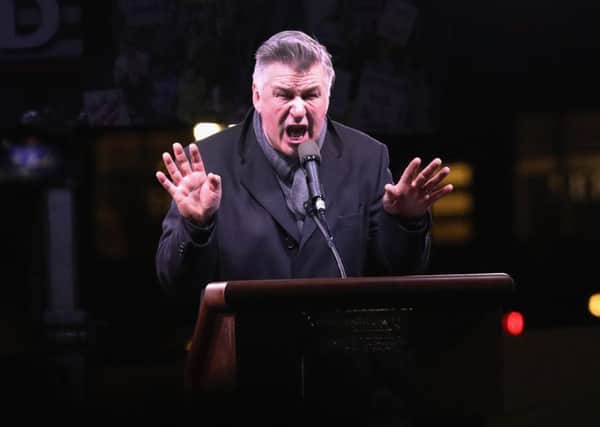Martyn McLaughlin: The proud tradition of satire is now a toothless irrelevance


It is hard to keep track of how many times the last rites have been administered to British satire, a patient that has been in parlous health for the best part of a generation. Somehow it has limped on, offering up infrequent bouts of tittering as evidence of life, when cadaveric spasms seem the likelier explanation.
The last great example – Christopher Morris’s Brass Eye – turned 20 years old this month. Instead of surveying the legacy of a television series which dissected its age, culture, and medium with unflinching precision, we are sustained by memories and retrospectives of a time when comedy grew out of genuine anger.
Advertisement
Hide AdAdvertisement
Hide AdA few years after Brass Eye aired, Barry Humphries warned the marriage of satire to mass media would produce a pervasive “frivolity, cynicism, and finally a vacuousness”. Our comedy now inhabits that void.
At a time when the world appears to be teetering on its axis, our response is ragbag of toothless panel shows, fearful of straying beyond glib barbs. For a country that gave the world Beyond the Fringe and That Was the Week That Was, it is a dispiriting situation, especially given the resurgence in US satire sparked by the Trump administration.
There can be no better example of this revival than Saturday Night Live. A 42-year-old institution whose alumni includes Bill Murray, Tina Fey, and Will Ferrell, the late night sketch show has long felt a rudderless shadow of its former self, lacking emphasis and bite.
In large part, that was due to the moderate politics and decency of Barack Obama, but even when Mr Trump emerged as his potential successor, it took the programme’s writers and performers time to readjust, with Alec Baldwin’s impressions of the Republican candidate never quite amounting to more than diverting burlesques.
This uncertainty among comedians over how to tackle Mr Trump was understandable. As a candidate, he wielded power without responsibility, free to make fanciful proclamations and slurs. He robbed satirists of what they depend on most of all – the power of exaggeration.
Now that he is president, however, the satire trade’s appetite has been whetted thanks to a steady catastrophe of ill-conceived policies and a backroom team that would look more at home manning the ghost train at an out-of-town carnival than it does in the White House.
One recent segment featuring the comedian Melissa McCarthy is a case in point. In it she offers up a character assassination disguised as an impersonation, ferociously deconstructing the seething, scattergun alpha male bluster of the White House press secretary, Sean Spicer.
Since it was uploaded to YouTube on 5 February, the clip has been viewed nearly 24 million times, and according to journalists in Washington, it has ruffled feathers in an administration that has little patience for weakness – perceived or otherwise – amongst its staff. This is satire at its best – mercilessly funny, yes, but also a corrective with which to expose folly and arrogance.
Advertisement
Hide AdAdvertisement
Hide AdIt remains to be seen if Saturday Night Live will live up to its newfound promise. Even if it loses its way, those with an appetite for satire are already well catered for in the US. The best of the lot, HBO’s Last Week Tonight, combines savage polemic with an investigatory zeal, often devoting 20-minute segments to target the grand institutions of American life.
It is an unorthodox approach which has routinely been misinterpreted as journalism. In fact, the show acts as an aggregator for existing news reports, assembling them into an argument before adding a liberal pinch of vitriol thanks to its British host, John Oliver.
A comedian from the West Midlands, his early forays to the Edinburgh Festival were met with a distinctly tepid critical response. “John Oliver has based his debut Edinburgh show on death,” began one 2002 review. “It is a concept he can be no stranger to, given the lukewarm reception his obscure observations receive.”
Nowadays, Mr Oliver has put such caustic reviews behind him and is at work on the fourth series of his multiple Emmy award-winning show. His unlikely ascension to stardom no doubt owes a debt to the way he has evolved his craft, but the most decisive factor was surely his decision to emigrate to a country unafraid of using humour as a weapon.
Had he stayed in Britain, it is all too predictable how Mr Oliver’s career would have panned out. He would, by now, be a veteran of Have I Got News For You, Mock the Week, and Radio 4’s The News Quiz. All are the comedic equivalent of hot water bottles; on occasion, they are capable of scolding, but by design they are intended to be warm, familiar and comfortable.
There is a slavish adherence to well-worn formats and well-kent faces in what passes for British satire. Where is our response to Mr Trump, the shockwaves of Brexit or an almost uniquely malicious Conservative government?
It is not for the want of new voices – Tom Walker’s left-wing fictional television reporter character, Jonathan Pie, has mustered over 12 million views online by riffing on all three issues, yet he remains a stranger to the viewing public.
Is it institutional cowardice and compliance issues that stop broadcasters from putting the boot in, or are we the viewers actually content with our blunt offering? Either way, it seems we are missing out not only on brave comedy, but an essential public service.